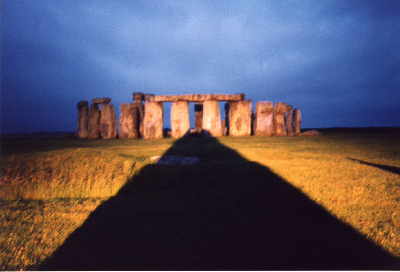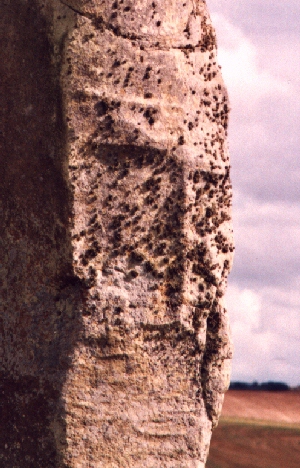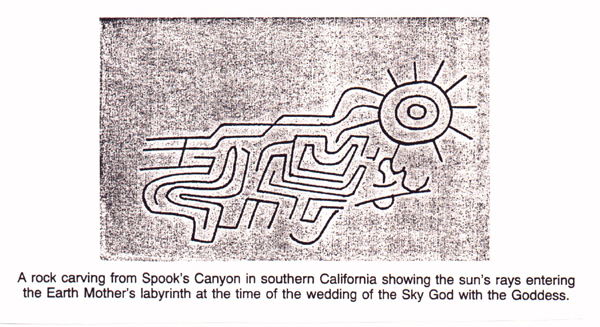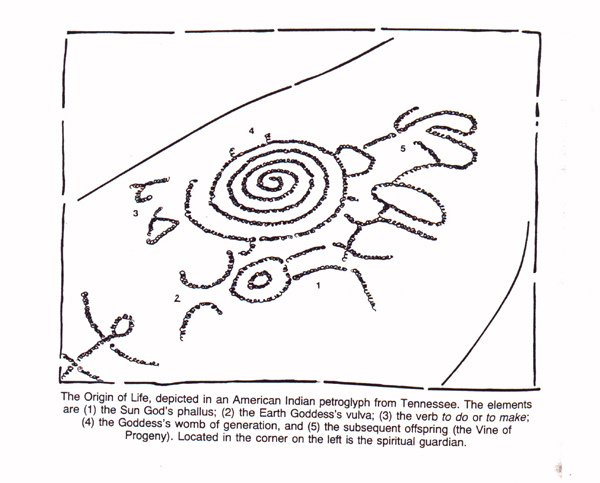
To make progress it is essential to try to understand
what circles, U-shaped settings and trilithons meant symbolically?
The most promising answer to these questions, based
on the latest research into ancient peoples and their religions and
which accord with all the known facts of science, archaeology and anthropology,
are outlined here.
First we emphasise that no complete answer
can ever be deduced because the builders, who have been so long dead, left
no literature to guide us. Nevertheless because the Stonehenge people
worked with symbols and integrated symbolic meanings into the stones, scholars
have identified enough meanings, using parallels from early agrarian cultures
elsewhere, to reconstruct an outline of the lost mythology. The formulation
of these concepts into a coherent and unified theory is due to the physics
professor Dr Terence Meaden, an archaeophysicist.
(1) To commence, Stonehenge, Avebury and the other
stone monuments of Western Europe were built over 4 millennia ago in an
era when Neolithic farmers believed in an Earth Mother and a Sky Father.
With this knowledge, scholars in ancient religions, proficient in the interpretation
of archaic artforms, see that the ordered stones of Stonehenge could constitute
an open-sky temple implicitly dedicated to the worship of the Earth Mother.
This is because the monument is heavy with feminine symbolism. Above
all, the several concentric circles and the U-settings appear to represent
the womb of the Earth Mother while the middle trilithon arch in the outer
circle is her vulva (refer to the plan of Stonehenge given on the previous
Stonehenge
Building web page).
Hence, it seems that a major purpose of the 35 narrow
arches (30 in the outer circle, 5 in the inner great trilithons) is to
emphasise still more the femininity of the monument; and that as
with Hindu temples throughout the world the object of
the cult is placed in the womb of the temple at its focal point.
At Stonehenge the Cult Stone has been inaptly called (since the 17th century)
the Altar Stone. It is the biggest of the Welsh stones and, when
freshly scraped and wetted, glistens in the sunshine because of its myriads
of mica mirrors.
(2) Next, the axis of the monument is directed at the rising
sun on midsummer's day. It is only on midsummer morning that the
rising sun penetrates the middle-arch of the womb to illuminate the internal
Goddess Stone with its radiant energy. Watchers would see the stone
sparkling in the reflected light of the Sky God, serving here in his role
of the Sun. This constituted a dramatic spectacle in which the actual
Marriage and Consummation of the Gods was witnessed.
Hence the inferred Creation Myth of the Stonehenge
and Avebury Peoples is that Earth Mother and Sky Father came together to
beget the world, and that the midsummer spectacle was the anniversary
and dramatic re-enactment of the primordial event.
In other words, the ongoing fertility myth could be that
by their annual mating God and Goddess guaranteed the success, the safety
and the fertility of the people's uncertain world which was forever at
risk from sterility, weather, disease and wild animals. It
may reasonably be conjectured that it was much the same at other stone
circles throughout the British Isles---wherein the simple circle is also
a womb or genital shrine to the Earth Mother---but that Stonehenge and
Avebury in England, Maeshowe in Scotland, and Newgrange and Knowth in Ireland
were the pinnnacles of the builders' achievements in expressing in stone
and light the concept of the Marriage of the Gods, a belief that was certainly
widespread throughout the Ancient World in one form or another (for two
examples refer to the bottom of this page).
The visitor should also note that at Stonehenge
shortly after sunrise a second effect took place --- in fact, it still
does. The phallic shadow cast by the Heel Stone (a stone which is arguably
the Sky Father's lithic personification on earth) also enters the vulvar
arch to encounter the female cult object --- the Womb Stone or Cult Stone.
Hundreds of believers waiting on the encircling bank could see this
spectacle happen to their entire satisfaction. This is demonstrated
in the photograph immediately below which was taken from the
point of view of an observer at the Heel Stone.

Visitors to Stonehenge may view this sunrise spectacle
from the roadside at 5 a.m. summer time on days when the sun rises
bright and clear and casts a sharp shadow. The best
dates are from 18 to 24 June annually.
Come and see for yourself this summer. (No permission is necessary
because you can view this from the roadside. Try to arrive no later
than 4.45 a.m.).
Hence, to put it poetically, the Heel Stone may be considered
the Sky God's representative on Earth not only because of this 'manifestation
of his powers' but because there is a carved head on the stone
as well.
A good colour photograph of
this head has been reproduced in two books: (1) Stonehenge:
The Secret of the Solstice and (2) Avebury: The Secrets
of the Stones. This photograph will be added to these web pages
at a later update.
The next photograph shows another recently-discovered face-carving at Stonehenge, which leads us to pose an unanswerable question:
 WHO
WAS THE ARCHITECT WHO
WHO
WAS THE ARCHITECT WHO
PLANNED STONEHENGE?
Although we can never know, one may ask
was it the person whose face is sculptured
into the side of trilithon stone 54 ?
Whoever this was, it must have been an
influential personage to have had facial
features preserved forever in this fashion.
DIVINE MARRIAGE IN OTHER CULTURES
The concept of Sacred Marriage between an Earth Mother and Sky
Father appears to have been quasi-universal, especially in early or primitive
agricultural societies.
Very many examples are known worldwide, not only from the
vast Indo-European regions but from the Americas, Africa, the Far East
and Oceania. Two non-Indo-European examples are given for introductory
purposes. These are important because the descendants of the believers
have explained the meanings to anthropologists.
(1) A petroglyph carved by the native
Americans of Southern California shows the rays of the
Sky Father or Sun entering the womb-like labyrinth of the Earth Mother.


(2) From Tennessee comes
another Indian stone carving which shows the phallus about to enter the
yoni of the Earth Mother as a sign and appeal for the fertility of the
land and its peoples.
